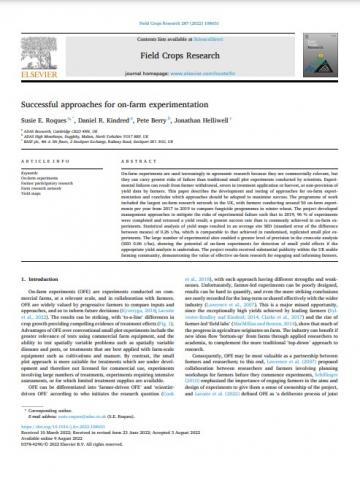Roques, S., Kindred, D., Berry, P., Helliwell, J. (2022). Successful approaches for on-farm experimentation. Field Crops Research 287 108561 https://www.sciencedirect.com/science/article/pii/S0378429022002222?dgcid=coauthor
Abstract:
On-farm experiments are used increasingly in agronomic research because they are commercially relevant, but they can carry greater risks of failure than traditional small plot experiments conducted by scientists. Experimental failures can result from farmer withdrawal, errors in treatment application or harvest, or non-provision of yield data by farmers. This paper describes the development and testing of approaches for on-farm experimentation and concludes which approaches should be adopted to maximise success. The programme of work included the largest on-farm research network in the UK, with farmers conducting around 50 on-farm experiments per year from 2017 to 2019 to compare fungicide programmes in winter wheat. The project developed management approaches to mitigate the risks of experimental failure such that in 2019, 96 % of experiments were completed and returned a yield result; a greater success rate than is commonly achieved in on-farm experiments. Statistical analysis of yield maps resulted in an average site SED (standard error of the difference between means) of 0.26 t/ha, which is comparable to that achieved in randomised, replicated small plot experiments. The large number of experimental sites enabled a greater level of precision in the cross-site analysis (SED 0.06 t/ha), showing the potential of on-farm experiments for detection of small yield effects if the appropriate yield analysis is undertaken. The project results received substantial publicity within the UK arable farming community, demonstrating the value of effective on-farm research for engaging and informing farmers.
Email agronomics@adas.co.uk if you would like a copy of the paper.






